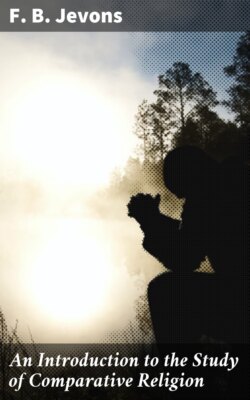Читать книгу An Introduction to the Study of Comparative Religion - F. B. Jevons - Страница 10
На сайте Литреса книга снята с продажи.
MORALITY
ОглавлениеTable of Contents
The question whether morality is based on religion, or religion on morality, is one which calls for discussion, inasmuch as it is apt to proceed on a mistaken view of facts in the history of religion. It is maintained that as a matter of history morality came first and religion afterwards; and that as a matter of philosophy religion presupposes morality. Reality, that is to say, is in the making; the spirit of man is self-realising; being is in process of becoming rationalised and moralised; religion in process of disappearing.
Early religion, it is said, is unethical: it has to do with spirits, which, as such, are not concerned with morality; with gods which are not ethical or ideal, and are not objects of worship in our sense of the term.
Now, the spirits which, in the period of animism, are believed to animate things, are not, it is true, concerned with morality; but then, neither are they gods. To be a god a spirit must have a community of worshippers; and it is as the protector of that community that he is worshipped. He protects the community against any individual member who violates the custom of the community. The custom of the community constitutes the morality of the society. Offences against that custom are offences against the god of the community. A god starts as an ethical power, and as an object of worship.
Still, it may be argued, before gods were, before religion was evolved, morality was; and this may be shown by the origin and nature of justice, which throughout is entirely independent of religion and religious considerations. On this theory, the origin of justice is to be found in the resentment of the individual. But, first, the individual, apart from society, is an abstraction and an impossibility: the individual never exists apart from but always as a member of some society. Next, justice is not the resentment of any individual, but the sentiment of the community, expressing itself in the action not of any individual but of the community as such. The responsibility both for the wrong done and for righting it rests with the community. The earliest offences against which public action is taken are said to be witchcraft and breaches of the marriage laws. The latter are not injuries resented by any individual: they are offences against the gods and are punished to avert the misfortunes which otherwise would visit the tribe. Witchcraft is especially offensive to the god of the community.
In almost, if not quite, the lowest stages of human development, disease and famine are regarded as punishments which fall on the community as a whole, because the community, in the person of one of its members, has offended some supernatural power. In quite the lowest stage the guilt of the offending member is also regarded as capable of infecting the whole community; and he is, accordingly, avoided by the whole community and tabooed. Taboo is due to the collective action, and expresses the collective feeling of the community as a whole. It is from such collective action and feeling that justice has been evolved and not from individual resentment, which is still and always was something different from justice. The offences punished by the community have always been considered, so far as they are offences against morality, to be offences against the gods of the community. The fact that in course of time such offences come to be punished always as militating against the good of society testifies merely to the general assumption that the good of man is the will of God: men do not believe that murder, adultery, etc., are merely offences against man's laws. It is only by ignoring this patent fact that it becomes possible to maintain that religion is built upon morality, and that we are discovering religion to be a superfluous superstructure.
It may be argued that the assumption that murder, adultery, etc., are offences against God's will is a mere assumption, and that in making the assumption we are fleeing "to the bosom of faith." The reply is that we are content not merely to flee but to rest there … 211–238
